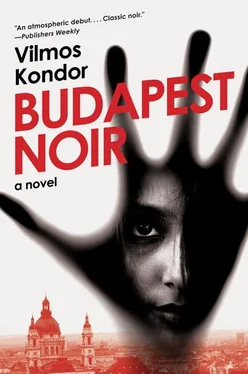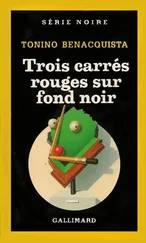Gordon raised his eyebrows and picked up his wineglass, but he didn’t drink; he just stared at the swirling, oily liquid. Krisztina watched him in silence, waiting patiently. “I’ve got to do something,” he finally said, so quietly that on a normal evening she wouldn’t even have heard him.
“If not for the girl, then for yourself,” said Krisztina.
“What did you say?” asked Gordon, leaning closer, for at that moment a large and noisy group walked in.
“Do what you must do,” came Krisztina’s strident reply.
“I will. And if you don’t mind, I’ve got to get going now to Csuli.”
“I’ll go with you.”
“No you won’t. It’s not your sort of neighborhood, and although I’ve got Csuli, I have no reason to trust him. Go on home, or drink another coffee, and get some work done. Develop a couple of pictures. Potter about in your darkroom.”
“I was beginning to think you’d tell me what to do.”
“I wouldn’t even try. But I’ll tell you what you won’t do. You won’t go with me.”
Csuli was sitting in the Tick Bite, playing cards. The tavern was permeated by the smell of beer and food, with shrill laughter, and with someone playing a sped-up version of the latest hit, “Gloomy Sunday,” on the piano. Cigarette butts covered the floor, couples leaned against each other, drunks strutted about. Gordon walked up to Csuli.
“Wait for me in the kitchen,” said Csuli without even looking at him. Gordon shrugged and went into the kitchen. There, a woman cook was trying to keep the chaos in check, and the kitchen boy was in the corner applying a cold compress to his hand. Gordon had never been inspired to eat in the Tick Bite to begin with, but this sight kept his appetite completely at bay. A block of lard was melting on the table in the middle of the kitchen, and beside it was an enormous heap of withering onions and potatoes; unidentifiable meats floated in a tub of water; and in front of the stove a cat was chewing on a bone. From the cook’s crazed expression, it seemed she hadn’t even noticed Gordon, who, having nothing better to do and feeling overwhelmed by the odor of burned lard, lit a cigarette.
He had to wait almost five minutes for Csuli. The fat man moved about in the kitchen, evidently feeling quite at home. He lowered a spoon into one of the pots, took a taste, and shook his head. “Don’t eat here, Gordon. Or anywhere else where you get a whole meal for one pengő.”
“I won’t,” Gordon replied, looking for an ashtray. Finally, he dropped the butt on the floor along with the others.
“Listen here,” said Csuli, leaning against the table and causing it to slide out of place. “Skublics attends meetings in Józsefváros. And with your luck, he’ll be there tonight, too. I got the dirt that he’ll be one of the folks leading the discussion, which means they’ll be there till dawn.”
“Where?” asked Gordon. The Józsefváros district was big, after all—stretching from the National Museum downtown out into the sweeping residential districts well beyond Blaha Lujza Square and the Grand Boulevard toward Kerepesi Cemetery.
For a while Csuli fixed his eyes on Gordon, and then rubbed his swollen hands together. “They meet in a cellar on Mátyás Square. They make themselves out to be coal heavers.”
“Thanks,” said Gordon.
Csuli watched him through narrowed eyes from behind his wire-frame glasses. “Don’t thank me. I don’t know why I’m helping you out.”
“You know full well,” replied Gordon. “Just one more thing.”
“What?
“Scratchy Samu for tonight.”
“He’s yours. But bring him back in one piece,” said Csuli. He ran his fingers nervously through his wavy blond hair before rolling out of the kitchen. On his own way out of the club, Gordon stepped over to Samu and quickly informed him of his task. “Don’t be late,” he added, “and don’t have too much to drink.” Pointing toward the fat man, he added, “If you muck it up, not only will I be angry, but Csuli will be, too.” Samu nodded while silently repeating to himself the address and time. Finally he downed the last of his wine. “It’ll all work out, Mr. Editor. I’ll signal you a clear path, I will. Don’t you worry.”
Stepping out of the Tick Bite, Gordon turned up his collar and lit a cigarette before hurrying toward the newsroom. He pondered his course of action. Knowing Skublics, the old man would laugh in his face if Gordon simply tried to tell him he saw him at a Communist meeting. No, he needed much more than this. He needed evidence. A photograph. Ideally, one in which Skublics could be seen in the company of other suspicious characters.
He could ask one of the staff photographers—maybe Flórián Sziráki—to help him. Gordon liked the man and often worked with him, but he knew that Sziráki wasn’t exactly renowned for his discretion. But he did know someone else, someone who took exceptional pictures.
On arriving in the newsroom, Gordon went straight to the telephone. Valéria looked up at him from behind her dark glasses but thought better of asking questions after seeing Gordon’s expression. Gordon checked his watch: it was nearly eleven. If he wanted to catch Skublics, he had to hurry. He looked up a phone number in his notebook and dialed. Half a minute later, he nodded in Valéria’s direction, then left.
As promised, the cab was in front of the building in five minutes. An Opel Regent that had seen better days pulled up to the curb. Behind the wheel was a man in his mid-forties, wearing a cabbie cap. “A fine good evening to you, sir,” he said with a partly toothless grin. “Where to?”
“Lövölde Square,” said Gordon, taking his seat. “And fast.”
“Yes, sir,” said the man, looking back briefly to check traffic, shifting the car into gear, and stepping on the gas. At the end of Rákóczi Street he swerved onto Rottenbiller Street, where he sped right by the horse-drawn carriages worming their way forward. Gordon held on to keep his balance. Not even five minutes had passed, and already they were on Lövölde Square.
“Wait right here,” said Gordon, getting out. The driver nodded enthusiastically and began rolling a cigarette. “You won’t have time to smoke it,” said Gordon. “We’re moving on in five minutes.”
“Yes, sir,” replied the cabbie, but he kept on rolling.
Gordon rang the bell for the super, who opened the building door with a tired face. Gordon pressed a pengő into his palm and asked him not to lock up because they’d be right out.
Krisztina was already in bed, reading. Freshly developed prints hung from the clothesline in the bathroom.
“Lucky you haven’t gone to sleep yet,” said Gordon, stopping in the doorway.
“What happened?” asked Krisztina, sitting up.
“If you want, now you can come help me out.”
“With what?”
“Taking some pictures.”
“Now?”
“Anything better to do?”
Krisztina shut her book and got out of bed. “Three minutes and we can be off.” She went into the bathroom, pulling the door behind her without quite shutting it. “Go ahead and fill me in. I’m listening.”
“Skublics is at a Communist meeting tonight on Mátyás Square. We need pictures of him there.”
“I don’t have a flash,” said Krisztina.
“You don’t need one, because I’ve come up with an idea.”
“What?”
“I’ll tell you in the car.”
“The car?”
Gordon sighed. “I called a taxi.”
“Then there’s really no time to waste,” said Krisztina, appearing in the bathroom door dressed for the task: trousers, a short knit coat, hair in a ponytail. “I’m getting the camera,” she said, stepping past Gordon.
Читать дальше
Конец ознакомительного отрывка
Купить книгу












